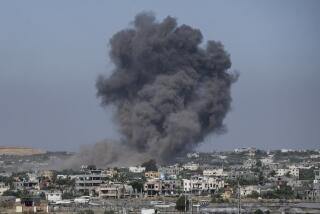Yemen Boosts Its Military Effort to Capture Al Qaeda Suspects
- Share via
ADEN, Yemen — Troop reinforcements Wednesday moved into the remote hills of central Yemen where government forces have battled armed tribesmen in an assault to capture suspected operatives of Osama bin Laden.
There was sporadic gunfire, but no fighting was reported in the provinces of Shabwa and Marib, where heavy clashes took place Tuesday as the government tried to capture five suspected Bin Laden loyalists being protected by the Abida tribe. Both provinces are known strongholds of Islamic militants.
Government security officials said it wasn’t clear when the additional troops would launch a fresh assault on villages in the rugged mountains and on hillsides.
Special forces trained with U.S. help moved on several hillside villages in the Al Halsun region of Marib on Tuesday with tanks, helicopters and artillery after the Abida tribe refused to hand over the five suspects. Four tribesmen and eight soldiers were killed. Seven other people died of their wounds Wednesday, security officials said. They did not provide details as to the victims’ identities.
The five suspects were able to hide or escape the barrage, according to tribal sources and security officials in Marib province, 100 miles east of the capital, Sana.
Yemen’s sweep appeared to be the most serious military operation yet by an Arab country against Bin Laden’s Al Qaeda terror network. The United States blames Al Qaeda for the Sept. 11 terror attacks and for a deadly October 2000 attack on a U.S. destroyer that was refueling in the Yemeni port of Aden. American officials have pressured the government of Yemen to crack down on the network’s cells in the country.
Defense Secretary Donald H. Rumsfeld said U.S. personnel were not directly involved in the operation. “If you’re saying, ‘Are we in there rooting around at the moment?’ No,” he told journalists in Washington.
He suggested that the Arabian Peninsula nation was acting to prevent Al Qaeda members from moving operations to its territory.
“We have made it very clear for a period of months that if these people go somewhere else, we’ll go find them,” Rumsfeld said. Officials in countries that are a “likely prospect for their next home . . . would want to try to clean out that crowd too, and apparently that’s what happened” in Yemen.
Security also has been tightened in the provinces of Hadhramaut, Abyan and Lahij, three other strongholds of Islamic militants. Bin Laden’s father emigrated to Saudi Arabia from the Hadhramaut border area.
Sources in the Marib region familiar with the operation said one of the men being pursued in the sweep was among three people named as suspected Al Qaeda operatives in Yemen. U.S. officials gave Yemeni President Ali Abdullah Saleh the suspects’ names during his visit last month to Washington. They said at least one of the men being sought was a non-Yemeni Arab who previously was in Afghanistan.
Bin Laden has substantial support in Yemen and Saudi Arabia, and his Al Qaeda network is believed to operate in dozens of countries.
Well-armed tribal fiefdoms have made it difficult for the government to impose the rule of law in Marib province. Since 1990, about 100 foreigners have been kidnapped in Marib. The 5,000-strong Abida tribe is the largest in the province.
More to Read
Sign up for Essential California
The most important California stories and recommendations in your inbox every morning.
You may occasionally receive promotional content from the Los Angeles Times.











